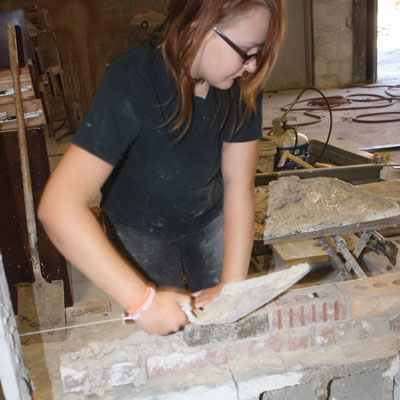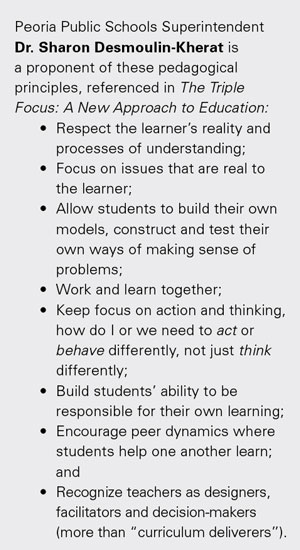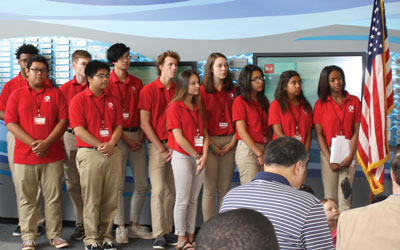Peoria Public Schools is creating new pathways and expanding opportunities for real-world experience.
Like many recent high school graduates, DéShone Wilson is undecided about her college major, and her top three choices are diverse: social work, fashion merchandising or forensic anthropology. Unlike many recent grads, however, she has made significant progress toward completing her college degree through the Peoria Public Schools (PPS) Early College program.
A member of the Richwoods High School Class of 2017, Wilson will enter Illinois Central College (ICC) with less than a year of college to go before earning her associate’s degree. While finishing high school, she has accumulated 24 hours of credit through both dual-credit classes at Richwoods and classes she has taken at the ICC North Campus in Peoria—and her ICC tuition for Early College has been paid through federal Pell Grants.
Unfreezing Tradition Early College is just one way Peoria Public Schools is changing the look of high school. Students at Manual Academy, Peoria High School and Richwoods High School are increasingly gaining more hands-on, real-world experience through career and technical programs and internships—and graduating with transferrable college credits. Early College consists of dual-credit classes offered through PPS’ three high schools, programs at Woodruff Career and Technical Center (WCTC), and on the ICC campus. Through Early College, juniors and seniors can qualify to take classes on the ICC campus, including night, weekend and summer classes.
Early College is just one way Peoria Public Schools is changing the look of high school. Students at Manual Academy, Peoria High School and Richwoods High School are increasingly gaining more hands-on, real-world experience through career and technical programs and internships—and graduating with transferrable college credits. Early College consists of dual-credit classes offered through PPS’ three high schools, programs at Woodruff Career and Technical Center (WCTC), and on the ICC campus. Through Early College, juniors and seniors can qualify to take classes on the ICC campus, including night, weekend and summer classes.
“We are ‘unfreezing’ the traditional high school, while building more meaningful relationships with higher education institutions,” explains Susan Grzanich, PPS Chief Curriculum and Instruction Officer. This “unfreezing” takes many forms, including:
- A revision of the credits needed for high school graduation, giving students flexibility to pursue internship and service learning opportunities, additional elective classes, and time for intervention and specialized instruction;
- The transition from class rank to the Latin system of academic recognition, which is a better reflection of what college admissions offices require;
- Equal Opportunity Schools (EOS), an initiative to steer traditionally underrepresented high school students toward more rigorous Advanced Placement (AP), International Baccalaureate (IB) and Early College classes;
- Expansion of Career and Technical Education (CTE) programs at Woodruff Career and Technical Center;
- A focus on competency-based education to give students more flexibility in earning credits;
- An ambitious and innovative strategic plan for Manual Academy;
- Establishing internships with local employers through the Greater Peoria Economic Development Council Peoria Pathways program; and
- The formation of AppsCo, a student-based mobile app development project designed to teach entrepreneurial skills.
All of these initiatives work hand-in-hand to achieve the first pillar of the Peoria Public Schools strategic plan—high standards; rigorous college and career curriculum; and engaged and relevant experiences—and the District’s mission: ensure that each student reaches his or her full academic and personal potential and is a well-balanced citizen.
“Education is not one-size-fits-all,” explains Dr. Sharon Desmoulin-Kherat, PPS Superintendent. “We know that many well-paying jobs in the future will not require a four-year degree, but will require highly technical skills and critical thinking skills. We are thinking outside the box and exploring many innovative solutions to give our students academic programs that will ensure that they succeed in the future economy.”
 A More Rigorous Path
A More Rigorous Path
The Equal Opportunity Schools (EOS) initiative brings more students into the Early College experience. Traditionally, the onus for applying for IB, or registering for dual-credit or AP classes, has been on students and their parents. As a result, these classes were frequently populated with students whose parents had attended college and who anticipated attending college themselves. In addition, some students avoided enrolling in these more rigorous courses, fearing an inability to meet the academic challenge, thereby lowering their GPA.
Research has proven, however, that high school students who take dual-credit and AP classes are far more likely to graduate from college—even if they struggle to master the content of those classes. The struggle itself is valuable in that it teaches students what to expect in college and how to succeed.
Through EOS, high school students and their teachers complete an in-depth survey to help counselors identify those students who are capable of IB, Early College or AP work, but may need extra guidance and mentoring. To assist these first-time students on a new, more rigorous path, the District is providing support labs during their regular schedule.
And EOS is succeeding at challenging the status quo. In the 2015-2016 school year, 55 Manual Academy students enrolled in AP or Early College courses; for the coming school year, 118 Manual Academy students are enrolled in those courses. At Peoria High School, the number of students enrolled in AP or Early College courses has increased from 172 in 2015-2016 to 282 in 2017-2018. At Richwoods, student enrollment in AP, IB and Early College courses nearly doubled from 308 in 2015-2016 to 596 enrolled for the coming year.
“This initiative has challenged our school district to change our mindset in regard to who we identify as potential college-bound students engaged in rigorous courses," explains PPS Academic Instructional Officer Thomas Welsh. "Student enrollment and success in these classes also represent substantial tuition savings to parents.”
Strands of Competency-Based Education
Although still in the developmental stage, competency-based education is another way the high school experience will change for Peoria Public Schools students in coming years. According to Grzanich, competency-based education consists of three strands. The first focuses on breaking the relationship between time and learning, allowing students to move forward at a pace that is most appropriate for them, which allows increased flexibility for internships, Early College or more diverse electives.
The second strand inserts academic content and credit into CTE courses. For example, in studying the complex physics of fire, students enrolled in the WCTC Emergency Services program may also be able to earn science credits; or by redesigning curriculum, a construction trades student may also earn math credits as part of the course.
As WCTC adds programs, more students will earn high school credits while gaining real-world career education. Students who complete the new Law Enforcement program, for example, will need just six additional college credits at ICC to earn a Law Enforcement certificate. In addition, a dozen students are working this summer to earn elective credit through field experiences, getting an advanced start on a Teacher Education pathway that is expected to launch in Fall 2018.
The third strand of competency-based education, which Grzanich explains is still under construction, is expected to offer alternative learning opportunities for students.
In recent months, PPS and Manual Academy administrators, faculty and parents, along with representatives from Peoria’s business, healthcare and social service communities, have developed a strategic plan for the south-side middle and high school. Among other tactics, the plan calls for implementation of a continuum of college and career opportunities using competency-based education, leading to a Pathways in Technology Early College structure.
The focus on technology builds on Manual Academy’s state-of-the-art manufacturing and welding program, which has received strong support from Caterpillar Inc., both in terms of equipment and consultation with Six Sigma Black Belt managers.
Manual was also one of 23 U.S. schools to win funding to build a FUSE studio, a project of the Northwestern University School of Education and Public Policy. Teacher Greg Gilson acquired the $26,000 grant to fund the project, which incorporates video game design to teach information technology, electronics, robotics, biotechnology, graphic design and app development.
Expanding Real-World Experience
In addition to earning college credit while attending high school, more students are interning to gain experience in the workplace. Through internships facilitated by Peoria Pathways, PPS high school students gain work experience and earn income. Peoria Pathways also hosts a monthly workshop for local employers on hosting high school interns.
Apostolic Christian Home provided part-time internships to three Manual Academy seniors during the recent spring semester, and all three have transitioned to full-time employment at the facility. Richwoods High School senior Sam Wolstenholm works six hours a week supporting the Autism Diagnostic Team at Easterseals of Central Illinois, while Infrastructure Engineering, Inc. hosts a Peoria High School student planning a career in civil engineering. Another student planning a career in law is interning this summer at the Illinois Guardianship and Advocacy Commission.
Richwoods junior Ciaran Maloney has an internship with OSF HealthCare focused on financial planning and accounting, the major he plans to pursue in college. “I heard about the internship from my business law teacher, Mr. Smith,” says Maloney. “It is a great learning experience and gives me opportunities for future growth. I would love to work with OSF through high school and college. The employees are always friendly, and the work environment is professional and welcoming.”
In a way, AppsCo is an internally-built internship for about 30 Richwoods students. Following a seven-week entrepreneurship class developed by Junior Achievement of Central Illinois, the students created a mobile app to enhance the marketing efforts of local businesses. The app for their first client, Mt. Hawley Country Club, was launched in late June.
Tim Cunningham, president of the Mt. Hawley Board of Governors, explained at the launch event that the club wanted to improve communication with membership, and chose to work with the AppsCo students instead of a for-profit business. “We’re very happy with the students, the process and the product. The process provided the students the opportunity to work with our members, who are community leaders. We couldn’t be prouder.”
The next step for Peoria Public Schools is to build on the internship model and expand to a pre-apprenticeship model. With a $250,000 grant recently awarded to PPS by the Illinois Department of Commerce and Economic Opportunity, along with another grant funded by the American Federation of Teachers to continue Peoria Pathways work, one career counselor will be added to each high school this fall. They will have a big job ahead of them in forming relationships with students to connect them with career pathways, internships and/or pre-apprenticeships.
"Our partnership with the Illinois Department of Commerce and Economic Opportunity will significantly increase the number of Peoria Public Schools students earning industry-recognized credentials in high-growth, high-demand occupations,” Welsh adds. iBi



